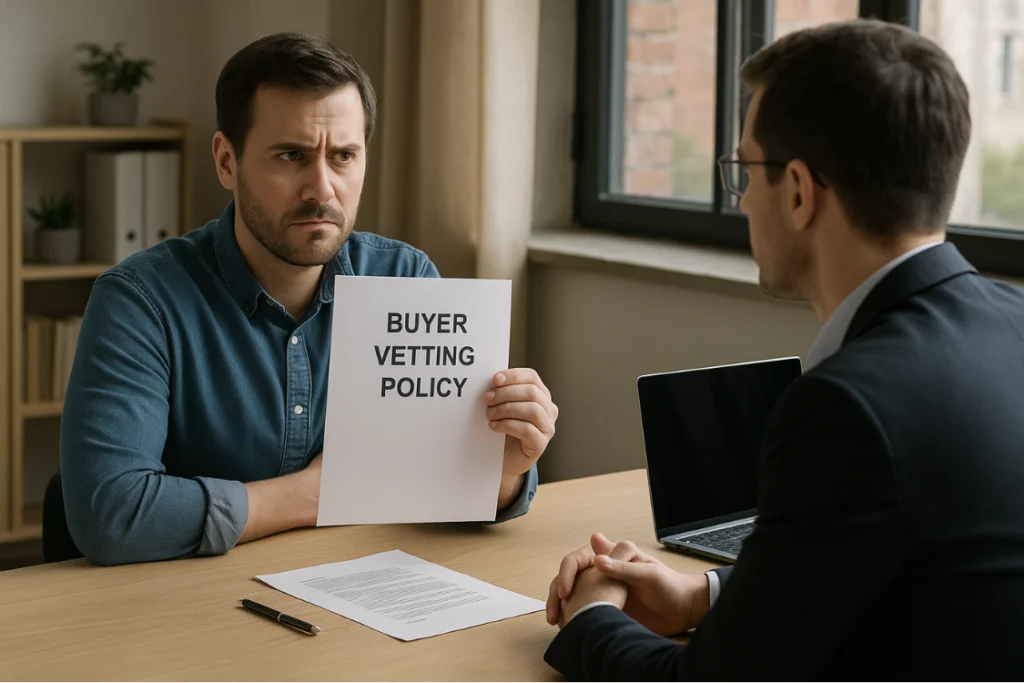Choosing the wrong buyer can derail the entire sale of your veterinary practice. Most practice owners feel overwhelmed during the selling process, especially when they’re asked to share financials, tax strategy, and staff details with someone they don’t fully trust. Without proper screening, unqualified or unserious buyers waste time, leak confidential information, and stall your deal. This is precisely why understanding how brokers vet buyers is so critical to a successful sale. A good broker plays a vital role in protecting your business, but only if they follow a clear, proven vetting process.
This article explains what strong screening looks like, and which red flags to watch, so you can protect your financial future and secure the best deal
Why Buyer Vetting Is So Important
Strong buyer vetting isn’t just about privacy. It’s about protecting the complex business model behind your veterinary practice. The sale of a clinic involves more than handing over keys. It includes transferring client relationships, internal systems, staff continuity, and operational risk—all of which are shaped by the way the practice is structured and managed.
Many veterinary practice owners feel exposed when selling. They’re sharing detailed financials, tax strategy, employee data, and sensitive client information. Without proper screening, these details may end up with buyers who are unqualified to sustain or operate the business effectively. Brokers who understand how to vet buyers can reduce that risk and help sellers align their goals with the realities of the buyer’s operational capacity.
Recent research on veterinary business models confirms that practices must be managed with a structure tailored to their legal, financial, and market context. There is no one-size-fits-all formula. In fact, buyers who lack experience with these variables may struggle to carry the practice forward after closing. Effective buyer vetting ensures your clinic doesn’t just sell—it transitions successfully.
Protecting your financial and confidential information
Once your veterinary practice is listed, sensitive data moves fast, especially when corporate buyers or competitors are involved. A qualified practice broker ensures no one sees your numbers without signing a non-disclosure agreement (NDA) and proving they’re legitimate. That kind of gatekeeping can play a major role in safeguarding your practice, your team, and your financial future.
Avoiding wasted time with unqualified buyers
Most buyers who show interest won’t make it to the finish line. Some are just curious. Others don’t have the money. Poor vetting creates distractions, delays, and frustration. It also means you may miss out on a better deal because the right buyer (possibly from a corporate group or a serious joint venture) moved on while your broker was chasing the wrong ones. For most practice owners, selling their practice is a once-in-a-lifetime decision. Wasted time costs more than just momentum.
How strong vetting improves closing success
Qualified buyers move faster, ask better questions, and are more likely to make multiple offers. When a broker does proper screening, the entire deal runs more efficiently, from the first meeting to final signatures. That’s how most practice owners reach a successful sale at the best price. Top veterinary brokers like the Ackerman Group often use structured processes to create competition and attract interest from other veterinarians, corporate buyers, or private equity groups like Topco Equity. Informed decisions come from knowing who’s at the table and how serious they are.

Ask: “How Do You Qualify Buyers Before They See My Books?”
Every owner thinking about selling their veterinary practice should ask this question. It reveals how much thought your broker puts into buyer screening before anything private gets shared.
A trusted veterinary practice broker should have a clear answer, not just a quick reply. The Ackerman Group and other top firms have built-in screening protocols that make buyer vetting a priority, not an afterthought.
What a strong broker response looks like
Veterinary brokers who take buyer screening seriously will outline a clear process that protects your business and improves your odds of a successful sale. When selling your practice, listen for these specific steps:
- Signed NDAs before any confidential information is shared during the sales process
- Proof of funds or financing pre-approval to ensure the buyer can complete the transaction
- Background checks and interviews to assess the buyer’s intent, experience, and cultural fit
- Reference to past practice sales and how similar buyers were qualified
- Matching based on experience in veterinary medicine and readiness to lead a team
- Use of a buyer database to identify serious leads, including corporate buyers and other veterinarians
These brokers understand that selling your veterinary practice is a major financial decision and they have systems in place to protect your best interests.
How does this question reveal their screening process
Vague answers usually signal weak systems. If your broker can’t explain how they screen potential buyers or what happens before a practice is shown, the process may be too loose. Good brokers use structured tools, like scorecards or pre-screening templates, to ensure they only present serious, qualified buyers to practice owners.
Pressing for real policies, not vague reassurances
Many owners hear soft answers like “We know how to spot serious buyers.” That’s not enough during what may be your biggest financial transaction. You need real screening policies. Ask to see the NDA form they use. Ask how they verify funding. If they’re working with corporate groups, joint venture buyers, or individual veterinarians, they should have a clear process in place to vet each one. That’s how informed decisions are made and how you protect your practice from costly missteps.

The Core Buyer Vetting Requirements
The best veterinary brokers rely on a short list of non-negotiables to screen buyers. These aren’t just preferences; they’re critical protections for your business and your financial future.
In veterinary practice sales, skipping these basic requirements can lead to wasted time, failed deals, or even legal risk. Experienced brokers apply them consistently to keep the process focused, secure, and aligned with the seller’s goals.
Signed NDA (Non-Disclosure Agreement)
Before any buyer sees your books, they should sign a clear, enforceable NDA. This protects your financial records, client lists, and staff details from being shared or misused. A good veterinary broker keeps signed NDAs on file and won’t show a practice without one.
Proof of funds or financing capability
A buyer without funding wastes time and stalls your momentum. Strong brokers verify capital early, whether it’s a bank letter, personal statement, or loan pre-approval. Buyers looking at vet practices should expect this request before serious talks begin.
Relevant experience or industry background
Not every buyer needs to be a vet, but experience in the veterinary industry—or in running a business—helps a lot. It reduces onboarding risk and makes co-ownership or joint venture deals more viable. Many brokers also consider cultural fit, especially when corporate buyers or large groups like Topco Equity are involved.
Why These Requirements Matter
Each requirement plays a role in keeping your sale on track. Without them, it’s easy to waste months chasing the wrong buyers or rushing into a deal that doesn’t hold up.
These basic filters give your broker the power to protect your best interests and maintain deal quality throughout the selling process.
NDA protects sensitive business info
NDAs create legal safeguards that may help you respond if confidential information is shared improperly. That includes pricing, client data, and operational details. In the veterinary industry, where trust and privacy matter, skipping this step creates major risk.
Proof of funds shows buying ability
Buyers who can’t afford your vet practice shouldn’t get past the first round. Proof of funds suggests they’re financially prepared to make a serious offer. Brokers who skip this step often struggle to create competition or attract serious bids.
Industry experience ensures strategic alignment
When a buyer has experience in veterinary medicine or has managed a similar type of business, they are better equipped to carry the practice forward. Familiarity with the profession’s evolving demands, including changes in client demographics, clinical practice, and veterinary public health, can influence how well a buyer aligns with your goals for continuity.
This type of experience isn’t just operational—it’s cultural. Buyers who understand the broader social, regulatory, and clinical context of veterinary practice tend to make more informed decisions. They are also more likely to value the systems, staff, and relationships that have shaped your clinic’s success.

Red Flags in Weak Buyer Screening
When brokers skip key vetting steps, it often leads to wasted time, broken trust, and lost deals. These red flags signal a lack of structure that puts your business at risk.
Many veterinary practice owners assume their broker is qualifying buyers behind the scenes. But loose screening invites the wrong people into the process, especially in high-stakes deals involving corporate groups or co-ownership offers.
No proof of funds required
If a broker allows buyers to view sensitive data without confirming they have financing in place, that’s a red flag. This opens the door to people who can’t afford the purchase. It also wastes your time and reduces the chance of creating competition among serious offers.
NDA skipped or delayed
Buyers typically shouldn’t access detailed financials without signing an NDA. Some brokers delay this step or send generic forms that don’t fully protect you. That’s risky, especially in the veterinary industry where client trust and employee loyalty are key. If your broker downplays this, look elsewhere.
Acceptance of vague interest or “looky-loos”
Some brokers send your listing to anyone who asks. Others accept loose signals like “I’m thinking about a veterinary practice” without asking further questions. This kind of soft screening makes it harder to reach the right buyer and leads to weeks of dead-end conversations.
What Great Brokers Do Differently
Top brokers don’t just list your practice; they shield it. They treat buyer vetting as a professional obligation, not a formality.
Their goal is to protect your sale, increase your leverage, and guide the entire process toward a deal that meets your goals.
Pre-screen buyers before making introductions
Strong brokers qualify buyers early. They ask about funding, experience, timeline, and intent before any introductions are made. If someone isn’t a fit for your veterinary practice, they don’t move forward. That focus saves both you and the buyer time.
Maintain a vetted database of qualified prospects
Veterinary brokers with strong networks often maintain a list of active buyers and begin screening when interest is shown. Some specialize in corporate buyers, while others focus on independent veterinarians or small practice groups. Having this database makes it easier to match you with the right buyer and get multiple offers.
Share only with buyers who meet clear criteria
Before sharing your confidential materials, great brokers confirm each buyer has signed an NDA, submitted proof of funds, and meets your criteria for cultural fit and transition expectations. This creates a smoother sales process and helps secure the best deal for your financial future.

How Brokers Vet Buyers Can Make or Break Your Sale
The right buyer won’t just appear; they’re qualified through a clear process.
The best veterinary practice brokers pre-screen all potential buyers, require NDAs, confirm funding, and assess their experience in veterinary medicine or business ownership. Each step helps filter out poor fits early and protects the value of your business.
Weak screening exposes your financials, drags out the deal, and puts your financial future at risk. Most practice owners only go through one sale, which makes it even more important to work with a broker who protects your best interests from the start. Strong vetting is often a key factor in achieving a successful sale.
Frequently Asked Questions
How do brokers qualify buyers in a business sale?
Many brokers qualify buyers by requiring a signed NDA, verifying proof of funds, and reviewing the buyer’s experience or business background when relevant.
Why is a signed NDA important before sharing business details?
An NDA protects your veterinary practice’s confidential financials, client data, and staff information from being misused or leaked.
What does proof of funds mean when selling a business?
Proof of funds shows that potential buyers have the financial ability to complete the sale, helping ensure a smooth and serious selling process.
Should I worry if a broker skips buyer screening?
Yes, skipping buyer screening puts your business at risk and often leads to delays, failed deals, or exposure of sensitive information.
How can I confirm my broker is vetting buyers properly?
Ask your broker directly how they vet buyers, and make sure they require NDAs, funding verification, and background checks before sharing your practice details.
References
- Beyer, K. (2021). Business model analysis of veterinary clinic: The case study. In H. Dincer & Ü. Hacioglu (Eds.), Eurasian business perspectives (Vol. 16/2, pp. 141–152). Springer. https://link.springer.com/chapter/10.1007/978-3-030-65085-8_9
- Bonnaud, L., & Fortané, N. (2021). Being a vet: The veterinary profession in social science research. Review of Agricultural, Food and Environmental Studies, 102, 125–149. https://link.springer.com/article/10.1007/s41130-020-00103-1



